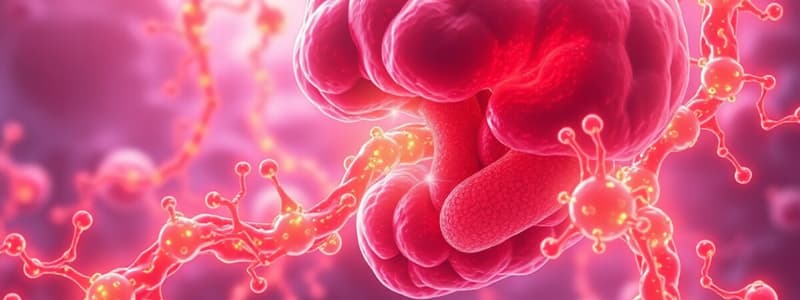Podcast
Questions and Answers
What is the primary organ responsible for cholesterol synthesis in the human body?
What is the primary organ responsible for cholesterol synthesis in the human body?
- Liver (correct)
- Kidneys
- Pancreas
- Lungs
Which enzyme is the key regulator of cholesterol synthesis?
Which enzyme is the key regulator of cholesterol synthesis?
- HMG CoA reductase (correct)
- Cholesterol oxidase
- Aldose reductase
- Cyclooxygenase
How are bile acids related to cholesterol metabolism?
How are bile acids related to cholesterol metabolism?
- Bile acids increase cholesterol synthesis.
- Bile acids are derived from cholesterol. (correct)
- Bile acids inhibit cholesterol absorption.
- Bile acids are synthesized from glucose.
What is the effect of hormones such as insulin and glucagon on cholesterol metabolism?
What is the effect of hormones such as insulin and glucagon on cholesterol metabolism?
Cholesterol is transported in the body primarily in which form?
Cholesterol is transported in the body primarily in which form?
What is the role of SREBP in cholesterol synthesis regulation?
What is the role of SREBP in cholesterol synthesis regulation?
What percentage of cholesterol is converted to bile acids in the liver?
What percentage of cholesterol is converted to bile acids in the liver?
Which enzyme is responsible for transferring a fatty acid to cholesterol to form cholesterol esters?
Which enzyme is responsible for transferring a fatty acid to cholesterol to form cholesterol esters?
What are primary bile acids formed from cholesterol in the liver?
What are primary bile acids formed from cholesterol in the liver?
Which of the following compounds does NOT require cholesterol for its synthesis?
Which of the following compounds does NOT require cholesterol for its synthesis?
What happens to excess cholesterol in the body?
What happens to excess cholesterol in the body?
How do bile acid sequestrants help in treating hypercholesterolemia?
How do bile acid sequestrants help in treating hypercholesterolemia?
Which class of hormones is involved in the regulation of cholesterol levels in the body?
Which class of hormones is involved in the regulation of cholesterol levels in the body?
What is the primary role of bile acids in digestion?
What is the primary role of bile acids in digestion?
Which of the following conditions is NOT associated with increased serum cholesterol?
Which of the following conditions is NOT associated with increased serum cholesterol?
What is the function of HMG CoA reductase in the body?
What is the function of HMG CoA reductase in the body?
Which process in adipose tissue leads to increased cholesterol levels due to higher free fatty acids in the blood?
Which process in adipose tissue leads to increased cholesterol levels due to higher free fatty acids in the blood?
What happens to LDL levels in individuals with impaired lipoprotein metabolism?
What happens to LDL levels in individuals with impaired lipoprotein metabolism?
Which bile acid is specifically mentioned as part of bile acid metabolism?
Which bile acid is specifically mentioned as part of bile acid metabolism?
How does insulin resistance affect cholesterol levels?
How does insulin resistance affect cholesterol levels?
What effect do elevated levels of free fatty acids have on cholesterol metabolism?
What effect do elevated levels of free fatty acids have on cholesterol metabolism?
Flashcards
SREBP regulation
SREBP regulation
SREBPs, synthesized as inactive precursors, are activated by cholesterol deficiency. SCAP escorts them to the Golgi where proteases activate them. The activated SREBP moves to the nucleus and increases the transcription of genes like LDL receptors and HMG-CoA reductase.
HMG reductase
HMG reductase
An enzyme crucial for cholesterol synthesis.
Bile Acids
Bile Acids
Derived from cholesterol, bile acids aid fat digestion and absorption. They are produced by the liver.
Cholesterol Esterification
Cholesterol Esterification
Signup and view all the flashcards
SCAP
SCAP
Signup and view all the flashcards
LDL Receptors
LDL Receptors
Signup and view all the flashcards
Bile acid sequestrants
Bile acid sequestrants
Signup and view all the flashcards
Cholesterol Function
Cholesterol Function
Signup and view all the flashcards
Cholesterol Metabolism
Cholesterol Metabolism
Signup and view all the flashcards
Cholesterol Synthesis
Cholesterol Synthesis
Signup and view all the flashcards
Cholesterol Function
Cholesterol Function
Signup and view all the flashcards
Normal Cholesterol Level
Normal Cholesterol Level
Signup and view all the flashcards
Dietary Cholesterol Source
Dietary Cholesterol Source
Signup and view all the flashcards
Bile Acid Function
Bile Acid Function
Signup and view all the flashcards
Cholesterol and Atherosclerosis
Cholesterol and Atherosclerosis
Signup and view all the flashcards
LDL's Role
LDL's Role
Signup and view all the flashcards
Increased Cholesterol Causes
Increased Cholesterol Causes
Signup and view all the flashcards
Bile Acid Pathway
Bile Acid Pathway
Signup and view all the flashcards
Cholesterol Synthesis
Cholesterol Synthesis
Signup and view all the flashcards
Cholesterol Transport
Cholesterol Transport
Signup and view all the flashcards
Diabetes & Cholesterol
Diabetes & Cholesterol
Signup and view all the flashcards
Study Notes
Cholesterol Metabolism
- Normal blood cholesterol level is 150-200 mg%.
- Cholesterol is a lipid, a sterol, present in animal cell membranes, and essential for many biological processes.
- It's a component of cell membranes and necessary for synthesizing biologically important compounds.
- High cholesterol may lead to atherosclerotic vascular disease.
- Vegetable oils do not contain cholesterol.
- All sterols are derived from cholesterol.
Cholesterol Background Synthesis
- Cholesterol is obtained through diet and synthesis in many cells.
- It's synthesized primarily in the liver, intestines, adrenal cortex, testes, and ovaries.
- Humans synthesize approximately 1 gram of cholesterol daily.
- A typical western diet contains roughly 500 mg of cholesterol daily, primarily found in meat, eggs, and dairy products.
- Cholesterol synthesis begins with acetyl-CoA.
How is Cholesterol Synthesized?
- Cholesterol synthesis begins with precursor acetyl CoA which comes from pyruvate dehydrogenase (pyruvate to acetyl CoA) reactions, or from beta-oxidation of fatty acids, or from reactions breaking down amino acids.
- HMG-CoA synthase helps create HMG-CoA (β-hydroxymethylglutaryl-CoA).
- HMG-CoA reductase is the rate-limiting enzyme, and statins are competitive inhibitors of this enzyme for lowering cholesterol.
- Squalene (30 carbons) becomes cholesterol (27 carbons) via multiple steps and is synthesized in the cytosol and endoplasmic reticulum (ER) of the cell.
How is Cholesterol Synthesis Regulated?
- HMG-CoA reductase is inhibited by cholesterol, steroid hormones, glucagon, and glucocorticoids.
- It is stimulated by insulin and estrogen.
- Regulation involves feedback repression to prevent over-production.
Regulation by Sterol Regulatory Element-Binding Protein (SREBP)
- SREBPs are synthesized as inactive precursors in the endoplasmic reticulum.
- In low cholesterol conditions, SREBP cleavage activating protein (SCAP) escorts SREBPs to the Golgi where proteases cleave the SREBP.
- The NH2-terminal region of SREBPs binds to the sterol regulatory element, increasing transcription of LDL receptors and the HMG-CoA reductase and increasing cholesterol uptake and synthesis.
Synthesis of Compounds Requiring Cholesterol
- Bile acids (80% from cholesterol) are essential for the digestion and absorption of fats and lipids in the liver
- Steroid hormones (corticosteroids, mineralocorticoids, estrogens) are cholesterol-derived
- Vitamin D is synthesized from cholesterol
- Cholesterol is also a crucial component of cell membranes.
- Biliary cholesterol esters are formed through acyl-CoA:cholesterol acyltransferase and excess is stored as cholesterol esters.
Cholesterol and Various Conditions
- Diabetes: Insulin resistance or deficiency can increase lipolysis and free fatty acids in the blood, further increasing liver cholesterol synthesis, as well as impairing lipoprotein metabolism.
- Obstructive Jaundice: Blocked bile ducts disrupt bile flow, leading to increased cholesterol accumulation in the blood.
- Hypothyroidism: Lowered thyroid hormones can reduce LDL receptor activity, decreasing LDL clearance from the blood and thus increasing LDL accumulation.
- Nephrotic Syndrome: High protein loss in urine may increase liver lipoprotein production, resulting in elevated cholesterol.
Studying That Suits You
Use AI to generate personalized quizzes and flashcards to suit your learning preferences.




